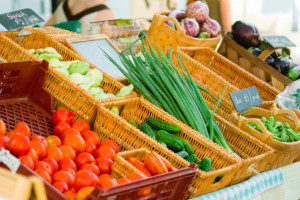Why is Eating Seasonal Important?
The phrases “eating seasonal,” or “eating seasonably,” have become popular as people become more concerned with buying their food locally, in order to support the local economy as well as gain the health benefits of eating seasonal.

For one, eating seasonal means a major decrease in shipping distances because one is not eating exotic fruits in the middle of winter. Eating seasonal equates to less fuel consumption and less pollution. Therefore, eating seasonal is an environmentally friendly habit to take on.
Five other reasons for eating seasonal are outlined in the article below from Whole Nine.
FIVE REASONS TO GO SEASONAL
When we talk about produce in our workshops, we are often asked whether “eating seasonal” is important. At first, we passed it off as a bit of an advanced topic – we just want you to eat your vegetables, people. However, after holding almost 40 workshops this year, we began to realize that despite the fact that our attendees all had differing priorities with respect to produce, eating seasonally kept them all moving in the right direction. However, “eating seasonal” isn’t as easy as it sounds, considering in America, we can eat whatever we want, whenever we want. Grapes in March? Asparagus in October? It’s all available (even if it has to be shipped 3,000 miles to get here). So let’s de-mystify seasonality, and talk about five reasons to go seasonal.
1. Seasonal = Less Expensive
The aforementioned grapes in March are probably going to come from Chile, and will probably cost you upwards of $5 a pound. Buying things out of season means long shipping times, fuel costs and other factors that all add up to an insanely huge price tag. And even if they’re not shipped a great distance, growing out-of-season produce in a faux-summertime greenhouse in the U.S. still adds up to more energy consumed and costs incurred, which are (of course) passed along to the consumer. Eating seasonally means buying things that can be grown locally (or relatively locally), in their natural weather and climate conditions. Less energy, less transit time, cheaper price tag. Winner.
2. Seasonal = More Nutritious
Vegetables may not be as much fun to eat as, say, coconut butter, but we eat them anyway, because we know they’re so nutritious. So why would you purposefully buy produce that has lost so much of its nutritional kick? As soon as a fruit or vegetable is harvested, the nutritional breakdown begins. Many vitamins present in the fruit or vegetable before harvest are highly unstable and are largely depleted after a few days. Since out-of-season produce may be shipped from thousands of miles away, it spends many days in transit, all the while losing some of the key nutrients. Buying produce at its height of seasonality (freshness) means the naturally occurring vitamins, minerals and phytochemicals are also fresh.
3. Seasonal = Yummy
Kale, spinach and Brussels sprouts may not make the top of our “fun foods” list – but they fall to the very bottom when they taste flat and dull. Fresh produce picked in-season is going to please our palates the most – think of a crisp Gala apple in October, or a juicy tomato in August. Out-of-season produce spending ten days in a transit crate arrives in your supermarket bruised, squishy and tired, lacking the vibrant flavors that make fresh vegetables and fruits so darn good.
4. Seasonal = Variety = Good
Eating seasonally means that every few month or two, we’re trying something new, and that’s a good thing for our taste buds and our health. Different vegetables and fruits contain a wide range of vitamins, minerals and phytochemicals… but we don’t get the good stuff that comes from asparagus or nectarines if all we eat are peppers, onions and apples. Following the seasons forces us out of our produce comfort zone – and increases the chances that we’ll stumble upon a few new vegetables or fruits that we didn’t even realize we liked.
5. Seasonal = Natural
A big part of our Whole30 program is designed to help you reset your broken food and hunger mechanisms. We want to return you to the place where “hungry” means “hungry” (not “bored”, “depressed” or “cranky”), and we want you to be in tune with whether your body is craving a particular food, or whether your brain just pitching a sugar tantrum. Being more focused on eating seasonally will help you reset those ancient and beneficial connections between body and brain, between ancestral heritage and today’s un-natural modern world. Fruit in the middle of winter isn’t “normal”, but acorn squash or kale chips sure do feel… right. Try making seasonal eating a bigger part of your Whole30 program and see if those connections reset even faster.
Get Seasonal-Savvy
So now you’ve got five good reasons to go seasonal… but what exactly IS in season today? Here’s where we’ve really got you covered. Check out our new Seasonal Produce Guide, designed to take all the guesswork out of produce seasonality. We’ve categorized things into the four seasons, plus a small “year-round” category as a nod to some of the technological innovations that allow us to have some foods around the clock. There are some regional variances, but in general, stick to things that are in season (or close to it) for the freshest, healthiest, tastiest produce in town. We’ve even given you some helpful hints as to our recommendations for nutrient density, and a “organic” indicator that indicates whether the particular item is generally ‘clean’ (pesticide-free) or ‘dirty’ (heavy on the chemicals, so buy organic if you can).
For a quick overview for eating seasonal on a month-to-month basis, here are the harvesting times for some of the fruits and vegetables grown locally in Massachusetts:
- May: asparagus and spinach
- June: strawberries and cherries
- July: blackberries, squash & tomatoes
- August: tomatoes, sweet corn, blueberries, peaches, pears and raspberries
- September: collards, apples and raspberries
- October: apples, cauliflower & collards
- November: cauliflower
Of course, this is not a complete list for those of you searching for, and deliberately eating, seasonal. Each month brings a variety of fruits and vegetables for eating seasonal, though some months are more abundant than others.
Dining at Salem Cross Inn is in some ways the equivalent of eating seasonal. We prepare all of our food here in our own kitchen, using the freshest local ingredients available to us. Visit our restored 1700’s era farmhouse in West Brookfield, Massachusetts, for a colonial dining experience while eating seasonal.
Do you make a habit of eating seasonal? Is eating seasonal something you feel strongly about? We would love to hear some of your methods for cooking and eating seasonal and local foods.







